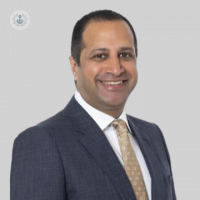Understanding congenital heart disease: Causes, treatment, and outlook
Written in association with:Congenital heart disease (CHD) is a condition present at birth that affects the structure and function of the heart. It arises due to abnormal development of the heart during fetal growth. This condition can range from mild, with little or no effect on health, to severe, potentially life-threatening conditions. Here, Dr Amit Bhan offers his expert advice on the condition, including the best forms of treatment.

What is congenital heart disease?
CHD encompasses a variety of abnormalities affecting the heart's structure, including defects in the walls, valves, and blood vessels of the heart. These defects can disrupt the normal flow of blood through the heart, leading to complications such as heart failure, abnormal heart rhythms, and inadequate oxygen supply to the body's organs.
The causes of CHD are not always clear, but factors such as genetics, maternal health during pregnancy, and environmental influences may play a role in its development. Some common types of congenital heart defects include atrial septal defect (ASD), ventricular septal defect (VSD), and tetralogy of Fallot.
How is it treated?
Treatment for congenital heart disease depends on the type and severity of the defect. Mild cases may require only monitoring and lifestyle adjustments, while more complex defects may necessitate transcatheter or surgical intervention.
- Medical management: In some cases, medications may be prescribed to manage symptoms and improve heart function. These medications may include diuretics to reduce fluid build up, medications to help the heart pump more effectively, or antibiotics to prevent infections before dental or surgical procedures.
- Interventional procedures: Minimally invasive procedures such as cardiac catheterisation may be used to repair certain types of congenital heart defects. During this procedure, a thin tube (catheter) is inserted into a blood vessel and guided to the heart, where small devices or plugs can be used to close holes or repair/replace damaged valves.
- Surgical intervention: Surgical procedures may be necessary to repair or correct structural abnormalities in the heart. This may involve open-heart surgery to close holes in the heart, repair or replace heart valves, or reroute blood flow through the heart.
Is It a serious condition?
Congenital heart disease can vary widely in severity, and the outlook for individuals with CHD depends on factors such as the type of defect, its severity, and the presence of other associated health issues. While some cases of CHD may have minimal impact on health and quality of life, others can be life-threatening if left untreated.
Regular medical follow-up is essential for individuals with congenital heart disease to monitor for complications, assess heart function, and adjust treatment as needed. With advances in medical technology and treatment options, many individuals with CHD can lead active, fulfilling lives with appropriate management and care.
Are there any other concerns I should be aware of?
- Lifestyle modifications: Individuals with congenital heart disease may benefit from making certain lifestyle modifications to promote heart health. This may include maintaining a healthy diet, engaging in regular physical activity within recommended limits, avoiding tobacco and excessive alcohol consumption, and managing stress.
- Family planning: For individuals with congenital heart disease who are considering starting a family, it is important to discuss potential risks with a healthcare provider. Some forms of CHD may have a genetic component, and there may be implications for pregnancy and childbirth that require careful consideration and planning.
- Emotional support: Living with a chronic health condition like congenital heart disease can be challenging, both physically and emotionally. Seeking support from healthcare professionals, support groups, or counselling services can help individuals and their families cope with the emotional impact of CHD and navigate the challenges of living with a chronic illness.
In conclusion, congenital heart disease requires a comprehensive evaluation and individualised treatment. With proper medical management and ongoing care, many individuals with CHD can live full and productive lives. It is important for patients and their families to work closely with healthcare providers to develop a treatment plan that meets their unique needs and maximises their overall health and well-being.
Dr Amit Bhan is a distinguished consultant cardiologist based in London. If you would like to book a consultation with Dr Bhan, you can do so today via his Top Doctors profile.


